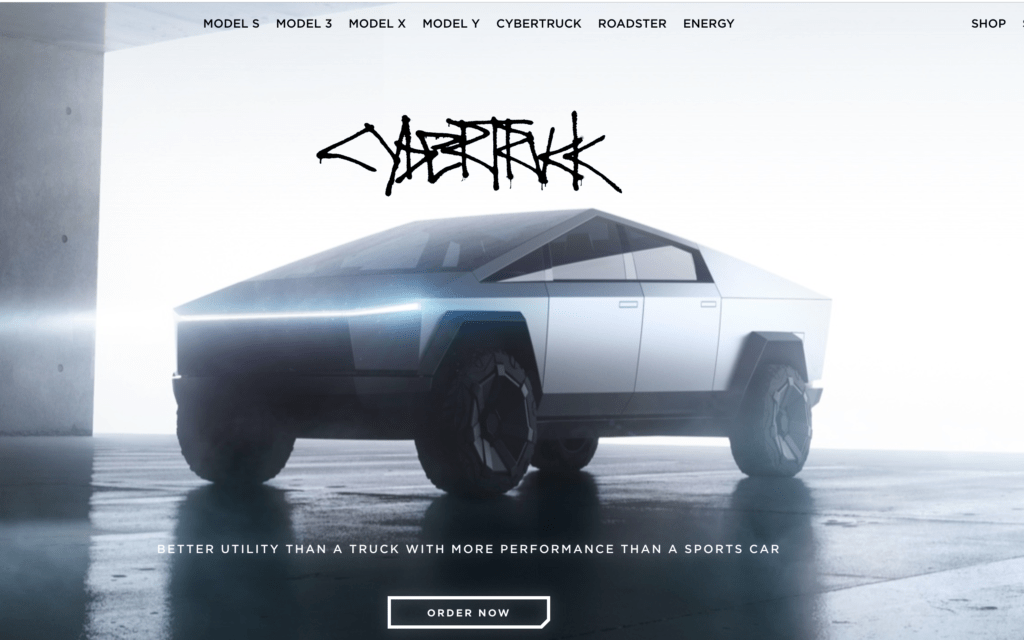In November 2019, Tesla Inc. founder Elon Musk unveiled the prototype for the company’s new electric pickup truck and we took a moment to see how Tesla protects trademarks in its brand portfolio such as CYBERTRUCK in the United States Patent and Trademark Office (USPTO). Thus far, there are three known models of Tesla’s “Cybertruck,” the most expensive of which can purportedly tow 14,000 pounds and drive as much as 500 miles on a single charge. According to Musk, the idea behind the cybertruck “…is to be a better truck than a [Ford] F-150 in terms of truck-like functionality and be a better sports car than a standard [Porsche] 911.” Now, the company is gearing up to begin production of the trucks, following at least 250,000 pre-orders of the vehicle in the wake of its November 21, 2019 reveal.
Given Musk’s entrepreneurial history, it is no surprise that even amidst what is surely a busy time for product development and manufacturing, Tesla has taken steps to shore up trademark protection for branding related to the venture.
Tesla Protects Trademarks With Applications in US Patent and Trademark Office
The company has filed several intent-to-use (ITU) applications with the United States Patent and Trademark Office (USPTO) for federal trademark registration of the brand name, and some variations thereof, as well as potential logo designs including the below public federal trademark records:
- CYBERQUAD in standard characters for “all terrain vehicles; land vehicles; electric vehicles; and structural parts therefor” in International Class 012, filed on November 22, 2019 [§1(b) filing basis]
- CYBERTRUCK in standard characters for “land vehicles; electric vehicles; trucks; pick-up trucks; automobiles; and structural parts therefor” in International Class 012, filed on November 6, 2019 [1(b) filing basis]
- CYBRTRK in standard characters for “land vehicles; electric vehicles; trucks; pick-up trucks; automobiles; and structural parts therefor” in International Class 012, filed on November 6, 2019 [1(b) filing basis]
- CYBRTRK (stylized) for “land vehicles; electric vehicles; trucks; pick-up trucks; automobiles; and structural parts therefor” in International Class 012, filed on November 6, 2019 [§1(b) filing basis]
CYBERTRUCK (stylized) for “land vehicles; electric vehicles; trucks; pick-up trucks; automobiles; and structural parts therefor” in International Class 012, filed on November 21, 2019 [1(b) filing basis].

Tesla’s portfolio of federal trademark applications in connection with the forthcoming cybertruck is a prime example of a smart filing strategy. Applying to register “CYBERTRUCK” (and the shortened version “CYBRTRK” as an extra measure) in standard character form, means that, once registered, the company will have statutorily-protected nationwide rights to those terms in any form or stylization they might assume as branding and marketing for the product evolves. By seeking registration of the prospective logos, Tesla will have federally-recognized rights to the design elements, which they will be able to enforce against any unauthorized third-parties that use similar stylization on similar terms. Additionally, by including the application for “CYBERQUAD,” the company has laid the foundation for developing a “family of marks” that includes the “CYBER” prefix.
Any new brand, whether launched by a multibillion global company like Tesla, Inc. or a by startup, must consider how it protects trademarks in its brand portfolio, and how to approach federal trademark application filing strategy in the USPTO by way of filing Intent-to-Use Applications under Section 1(b), or Use-in-Commerce Applications under Section 1(a), and maximize trademark protection of the brand in the United States. Consultation with an experienced tech startup lawyer with trademark expertise can help entrepreneurs decide which types of trademark applications to file, whether to include their logos or solely words, whether to include variations and which application type to use, among other important considerations.

